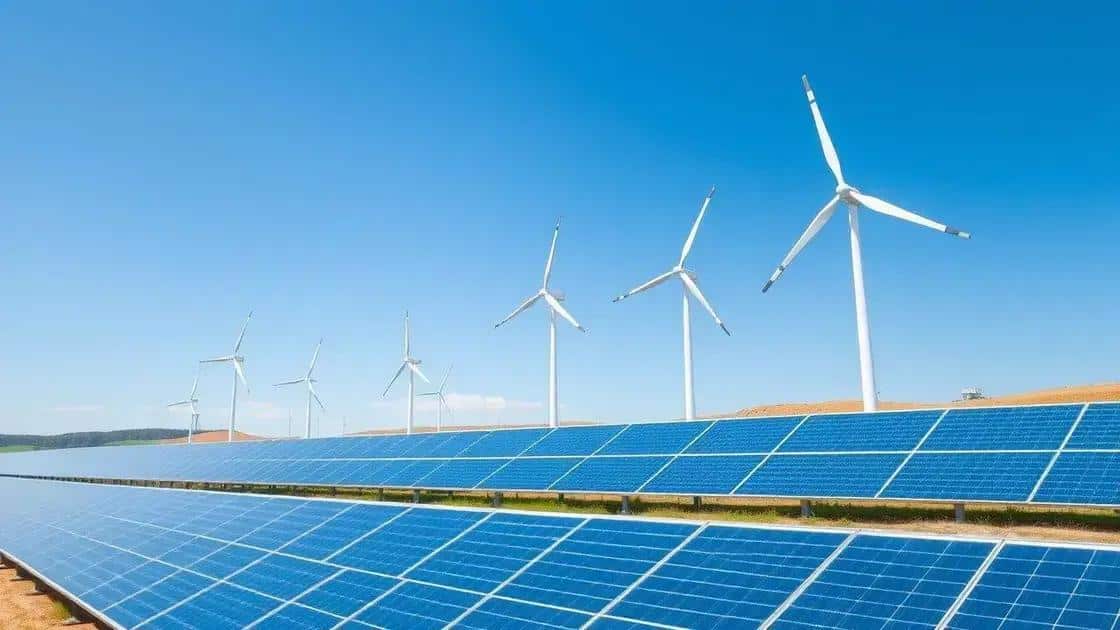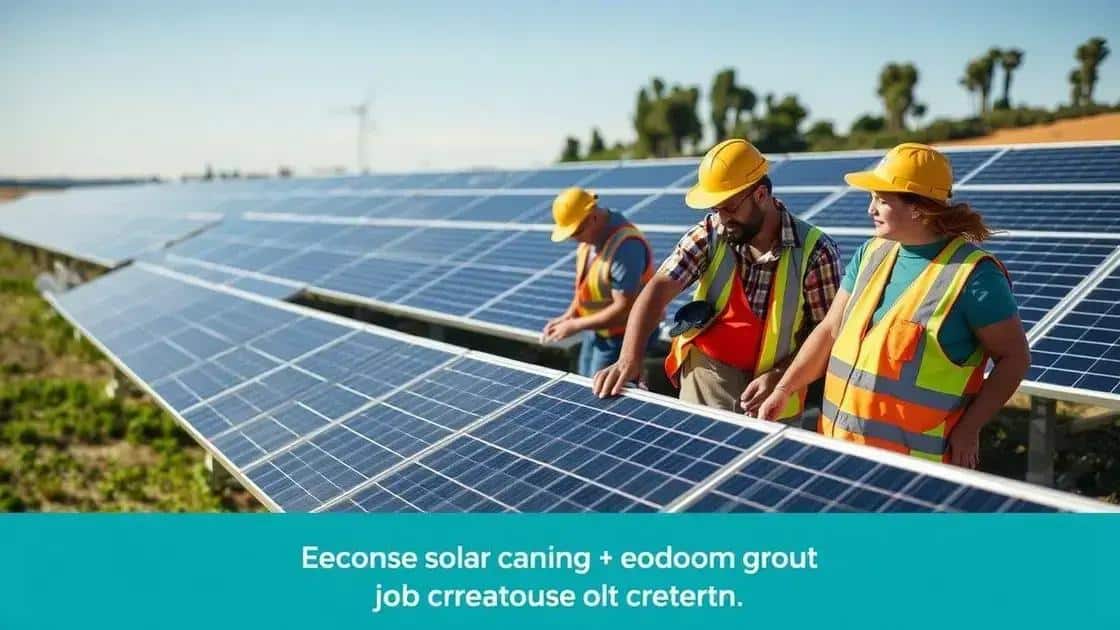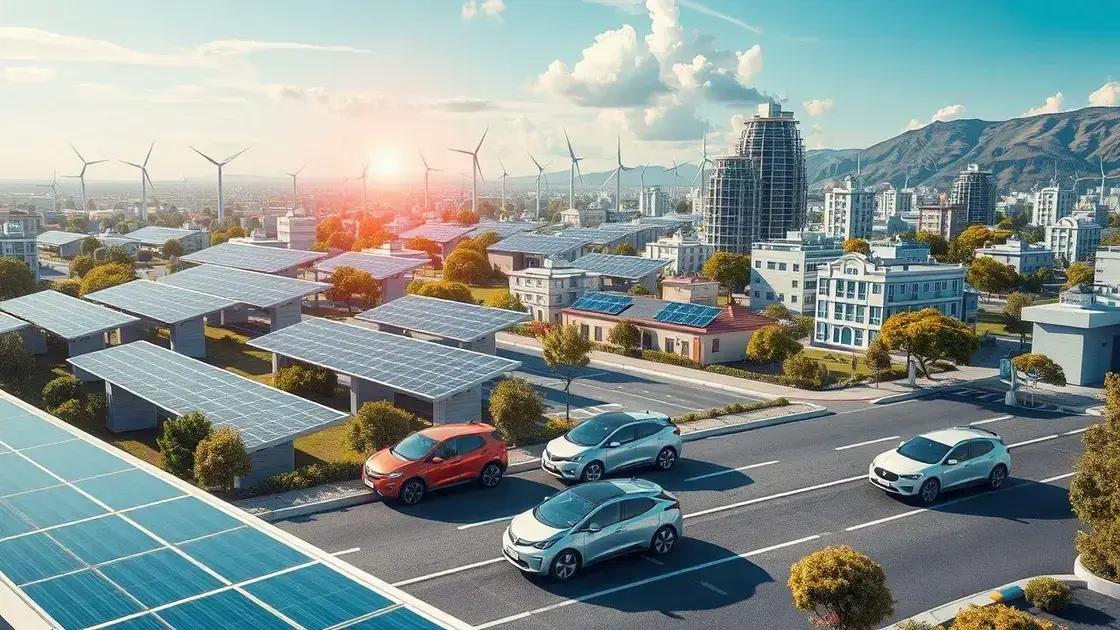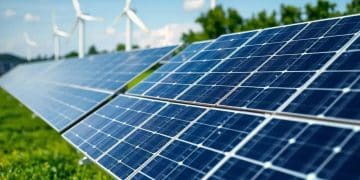Insights on clean energy projects usa that you should know

Insights on clean energy projects in the USA highlight their benefits, including reduced emissions, job creation, and advancements in technology, while also addressing challenges like costs and regulatory hurdles.
Insights on clean energy projects usa are shaping the way we think about sustainability and innovation. Ever wonder how these projects influence our daily energy consumption and environmental health? Let’s dive into the fascinating developments in this critical area.
Overview of clean energy projects in the USA
Overview of clean energy projects in the USA reveals a dynamic landscape of innovation and sustainability. Across various states, numerous projects are emerging, showcasing a commitment to reducing carbon footprints and investing in renewable resources.
The growth of solar and wind energy projects reflects a significant shift towards cleaner energy sources. For instance, California and Texas lead the nation with large-scale solar farms and wind turbines that harness natural resources effectively. These projects not only generate electricity but also create jobs and foster economic growth.
Major Types of Clean Energy Projects
There are several types of clean energy projects currently making an impact:
- Solar Farms: Large installations that convert sunlight into energy.
- Wind Farms: Networks of wind turbines that leverage wind power to generate electricity.
- Hydropower Facilities: Utilizing water flow to produce energy sustainably.
- Geothermal Projects: Harnessing the Earth’s heat for energy generation.
Each of these projects contributes to a growing portfolio of clean energy solutions. The benefits extend beyond environmental impacts; they offer new economic opportunities and a path toward energy independence.
As technology advances, the efficiency of these projects improves. For example, innovations in solar panel efficiency and wind turbine design are enabling greater energy capture, resulting in lower costs and higher output. Moreover, federal and state incentives encourage investment in clean energy, making it financially attractive for both developers and consumers.
Furthermore, community involvement plays a crucial role in the success of these projects. Local stakeholders often collaborate to identify the best locations and methods for implementation, ensuring that the benefits are widely shared.
Key benefits of clean energy initiatives

Key benefits of clean energy initiatives highlight how shifting to renewable resources can truly transform our world. These benefits are not just environmental; they extend into economics, health, and energy security.
One of the most significant advantages is the reduction of greenhouse gas emissions. Transitioning to clean energy sources like wind and solar significantly lowers the pollutants released into the atmosphere, helping combat climate change. Additionally, cleaner air results in better health outcomes for communities, reducing respiratory issues and healthcare costs.
Economic Advantages
Implementing clean energy initiatives also brings substantial economic benefits. The growing sector creates numerous jobs across various fields, from manufacturing to maintenance.
- Job Creation: The clean energy sector offers well-paying jobs, from engineers to laborers.
- Energy Independence: Reducing reliance on imported fuels enhances national security.
- Cost-Effectiveness: The price of renewable energy technologies has dropped significantly, making them competitive with traditional energy sources.
- Increased Investments: Clean energy attracts investments, boosting local economies.
These advantages illustrate how clean energy not only protects our planet but also promotes a thriving economy. Transitioning to these energy sources is vital for sustainability and resilience.
Furthermore, clean energy initiatives support energy security by diversifying energy sources. This diversification makes energy systems more resilient to supply disruptions and price volatility. When regions invest in local energy projects, they can stabilize their energy prices in the face of global market fluctuations.
Challenges faced in implementing clean energy
Challenges faced in implementing clean energy initiatives are significant and multifaceted. While the shift to renewable energy is essential, various obstacles can slow progress and create hurdles for both developers and communities.
One major challenge is the upfront cost associated with clean energy projects. Although prices have fallen in recent years, the initial investment for building infrastructure like solar panels or wind turbines can be substantial. This financial barrier often deters potential investors and developers.
Regulatory and Policy Hurdles
In addition to funding issues, navigating the complex regulatory environment can be daunting. Different states have varying regulations that govern renewable energy projects, making it difficult for developers to plan and execute their initiatives.
- Zoning Laws: Local zoning regulations can limit where projects can be built.
- Permitting Processes: Lengthy approval times can delay project implementation.
- Incentive Programs: Variability in federal and state incentives may affect financing.
- Interconnection Standards: Connecting to the grid requires meeting specific guidelines that can be challenging.
Moreover, public perception plays a pivotal role in the success of clean energy initiatives. Some communities may resist projects due to concerns about aesthetics, noise, and changes to local ecosystems. This opposition can stall or even halt projects before they begin.
The need for a skilled workforce is another critical challenge. As the clean energy sector grows, there is a pressing demand for trained professionals who can operate, maintain, and promote these technologies. Without sufficient educational programs and training resources, the industry may struggle to find qualified workers.
Future trends in clean energy projects

Future trends in clean energy projects indicate a promising direction for sustainability and innovation. As we look ahead, several key developments are shaping the clean energy landscape, setting the stage for a more sustainable future.
One significant trend is the increasing integration of energy storage solutions. As renewable energy generation, such as wind and solar, becomes more prevalent, the need to store energy for use during non-productive times is crucial. Advances in battery technologies, like lithium-ion and solid-state batteries, are expected to enhance energy storage capabilities, making it easier to balance supply and demand.
Rise of Smart Grids
Another crucial trend is the rise of smart grids. These systems use digital technology to monitor energy flows and improve the reliability and efficiency of electricity distribution. With smart grids, consumers can more effectively manage their energy use, leading to a reduction in waste and increased adoption of renewable sources.
- Decentralized Energy Generation: Households using solar panels will be able to generate their own clean energy.
- Demand Response Technologies: These systems will shift or reduce energy use during peak periods to balance energy demand.
- IoT Integration: The Internet of Things will facilitate smarter energy management solutions.
- Real-time Monitoring: Enhanced monitoring systems will help optimize energy distribution.
Moreover, the electrification of transportation is set to play a significant role in the future of clean energy. As electric vehicles (EVs) become more mainstream, the demand for clean electricity will rise, creating new opportunities for integrating renewable sources into the transportation sector. This shift supports the reduction of fossil fuel dependency and improves overall air quality in urban areas.
Investments in clean energy technologies are also expected to increase significantly. Governments and private sectors are recognizing the importance of transitioning to sustainable energy sources. Overall, the future hints at a greater alignment of economic policies with clean energy goals.
In summary, the future of clean energy projects holds great promise for both the environment and the economy. By overcoming challenges such as regulatory hurdles and public perception, we can pave the way for more sustainable practices. As technology advances and investment increases, the shift towards clean energy will not only reduce emissions but also foster new job opportunities and enhance energy security. Embracing these changes is essential for a healthier planet and a more resilient future.
FAQ – Frequently Asked Questions about Clean Energy Projects
What are the main benefits of clean energy projects?
The main benefits include reduced greenhouse gas emissions, job creation, energy independence, and technological advancements in energy storage and smart grids.
What challenges do clean energy projects face?
Challenges include high initial costs, regulatory hurdles, public perception issues, and the need for a skilled workforce.
How does clean energy impact local communities?
Clean energy projects can enhance local economies by creating jobs and fostering sustainable practices while reducing pollution and improving public health.
What future trends should we expect in clean energy?
Future trends include the rise of energy storage solutions, smart grids, decentralized energy generation, and increased investment in renewable technologies.





